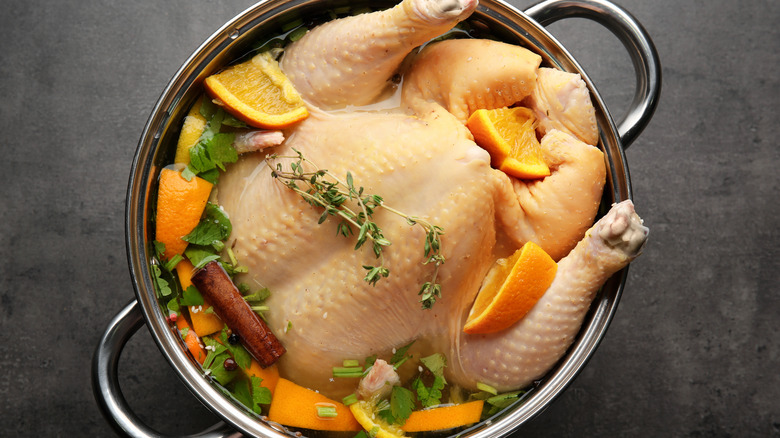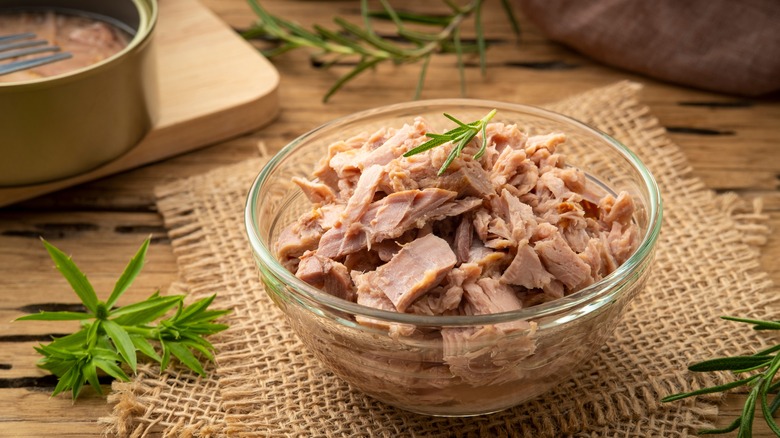Why You Should Stop Throwing Out Olive Brine (And Add It To A Marinade Instead)
Brining meat, or infusing it with flavor via salt absorption, is one of those techniques that sounds great in a food blog or on Instagram, and you know will probably taste amazing, but then life gets in the way. Most brining recipes are for big cuts of meat that need to sit in their brining solution for a couple of days, like turkeys for Thanksgiving or pork shoulder. When you're trying to get dinner on the table every night, however, a four-day recipe probably isn't the first thing you're going to attempt.
Don't write off brining altogether, however, because there are a lot of misconceptions. Not only is it easy (all you really have to do is let the thing you want to cook sit in a brining solution), but you don't even need to make your brine from scratch. There's a pretty good chance that you've got plenty of pre-made brine hanging out in your fridge right now, you just think of it as olive and pickle juice.
Instead of dumping that salty, vinegary liquid left behind after you eat all the olives and pickles (or capers, mushrooms, giardiniera, and so on), save it for brining some chicken, pork, or even tofu for a flavorful weeknight supper. Marinating a few small pieces of meat in olive juice only takes a few hours, and it's also a great way to use up everything in your fridge, which will cut down on food waste and also save you a little money.
Olive juice is flavor
Using up your leftover olive and pickle juice is a great way to make something out of nothing, which is a cooking instinct that both professional chefs and your grandma can agree on. Pickling is just brining, and brining is also a kind of marinating, so if brining still sounds like a lot of work, just think of it as marinating. All you're doing, in either case, is soaking your food in a flavorful solution that will, according to Cook's Illustrated, denature the proteins and trap water in the muscle, making the meat juicer. This is why brining is so often recommended for turkeys and big cuts of pork — they are notoriously overcooked and dry. But the process works just as well with a couple of chicken breasts or a pound of wings, and the bonus with smaller cuts is that they take a lot less time to brine.
All you need to do to use olive juice (or any other leftover briny liquid) is to simply transfer it from the original jar into a container with whatever it is you'd like to brine. If you want to brine or marinate a couple of chicken thighs, for example, just put them in a bowl, add the olive juice along with the herbs and spices of your choosing, cover the bowl, and pop it in the fridge for a few hours.
Brine and thaw at the same time
If you're already planning to marinate/brine your meat overnight, you can pull a bit of a culinary two-fer by thawing meat from the freezer in the brine overnight. A great way to save some money at the grocery store is to buy family-size packs of meat on sale and freeze them in meal-size portions in bags like Kenji Lopez-Alt. One of the best ways to defrost frozen meat is to transfer it to the fridge. A couple of chicken breasts, pork chops, or some drumsticks will thaw overnight at normal fridge temperature — around 35 degrees Fahrenheit. So when you pull out your preferred protein to thaw, put it in a bowl and dump olive juice over it, then store it covered until you're ready to cook the next day.
When you're ready to cook, you can make your brined meat however you'd like — be it roasted, sauteéd, or even deep fried (in fact you should always brine your fried chicken). The cooked meat should turn out juicy and tender, and have a little extra flavor from the seasonings in the olive juice. Just be sure to dump the liquid after you're done brining since it was used for raw meat and can be a source of cross-contamination, as noted by the Austin American-Statesman. You can feel good knowing you've already enjoyed its benefits more than once!


